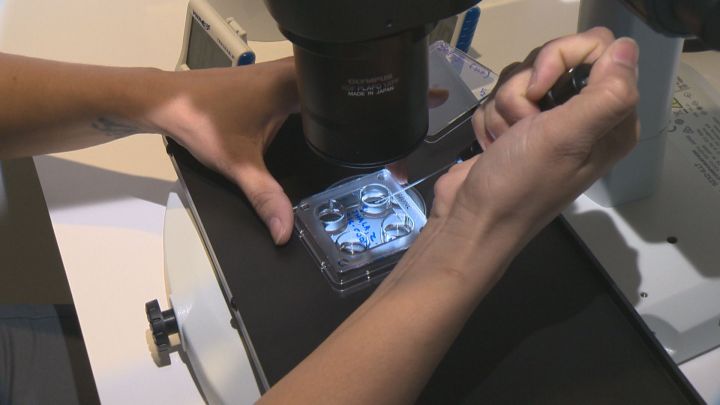This article is part of a Global News investigation into fertility in Canada, and the emotional and financial impact infertility has on Canadians struggling to conceive. Read more of our coverage here.

***
The stories are rare, but terrifying.
A doctor inseminating women with sperm taken not from their husbands, but from his own body.
A woman collapsing and being rushed to hospital as a result of a pregnancy occurring outside her uterus, her ovaries swollen by a cocktail of powerful drugs.
And another woman being told that a clinic would not help her conceive unless the sperm donor was of the same race.
Across Canada, dozens of private fertility clinics have offered their services for decades to individuals and couples struggling to have a child. Incidents like the ones described above remain very uncommon.
But as the demand for in-vitro fertilization and other assisted reproductive treatments surge, many of these facilities are still operating without consistent oversight or standards of clinical care, which can leave the door open for malpractice.
“In terms of oversight of fertility clinics, other than in Quebec there’s not really much going on from a governmental perspective,” said lawyer Sara Cohen, who has a practice devoted exclusively to fertility law.
While the services offered at fertility clinics in Canada are “generally excellent,” Cohen said she does feel there should be more regulation in place.
“How many times are people doing certain treatments that they shouldn’t be doing many times?” she wonders.
“What kind of information are people getting, whether it’s about the risks or the likelihood of success?”
Oversight across the country a patchwork, at best
Because it is part of the broad array of healthcare services offered to Canadians, treatment of infertility falls under provincial, not federal, jurisdiction.
A previous attempt to regulate the various treatments from on-high in Ottawa failed when the Supreme Court of Canada struck down most of the Assisted Human Reproduction Act in 2010.
Recently, Health Canada has moved to update the rules it still has control over, mainly linked to donated eggs and sperm.
READ MORE: Ontario doctor allegedly used own sperm to impregnate fertility patients

But it’s up to the provinces and territories to regulate, accredit, license and/or inspect clinics and individual physicians.
What has resulted is a patchwork of approaches to monitoring the country’s fertility clinics that ranges from the very stringent to the not-so-much.
READ MORE: Here’s what you need to know about Ontario’s Fertility Program, one year later
In Quebec, a provincial law governs all clinical and research activities linked to assisted reproduction. The private fertility clinics that offer IVF and other treatments to help people conceive are subject to licensing, accreditation and inspection regulations.
In Alberta, the province’s College of Physicians and Surgeons accredits clinics that provide IVF and has standards in place specific to those facilities.
British Columbia, meanwhile, also has a program for accrediting fertility clinics through its own college.
“They have a very developed program now for accrediting us as an IVF unit,” said Dr. Jeff Roberts, a fertility specialist based in Vancouver who also serves as president of the Canadian Fertility and Andrology Society.
“I think the spirit of the regulation across Canada will be the same.”
Many private fertility clinics in Canada also adhere to standards set by Accreditation Canada, an independent not-for-profit agency. All of these accreditations are voluntary.
READ MORE: Paying to treat infertility: Coverage varies widely across Canada
In a report published last year, the Canadian Medical Association made it clear that while the provinces and territories should retain jurisdiction, national standards are needed for “monitoring research related to (assisted human reproduction), training physicians in ART, and guidelines for medical procedures and accreditation of facilities where ART is practiced.”
There simply isn’t a coordinated effort across the country in these areas, the report notes.
In Ontario, for instance, there are no regular inspections or standardized clinical-care guidelines for clinics.
Cohen said she is also particularly concerned by a lack of regulation for the care and monitoring of donors.
It’s illegal to accept payment for sperm or eggs in Canada, or to pay a surrogate to carry a fetus to term. As a result, she explained, it’s hard to convince the provinces to implement rules that would further discourage people offering these things for free — like limiting the number of times a person can serve as a surrogate or donor.
“We’re so busy saying ‘it’s very important that we don’t pay a man $100 for donating sperm,’ but instead we’re just using the same sperm over and over and over again. Which one is worse?”
Not a ‘Wild West’
Roberts was careful to note, however, that fertility clinics are not in a ‘Wild West’ situation where anything goes and patients are unprotected.
READ MORE: Paying to treat infertility: Coverage varies widely across Canada
The doctors who work in the clinics are subject to the same ethical and professional regulations as any physician, as set out by the various colleges. If patients are unsatisfied, they can lodge a complaint.
“If patients are put in harm’s way, you’re dealt with not just at the level of reproductive practice but as a physician in general,” said Roberts.
READ MORE: What it’s like to find out you can’t have a baby naturally

The same goes for the other medical professionals working in clinics, he added, including administrative staff, embryologists and nurses.
“We’re all bound by the same confidentiality standards and standards of care as for general medicine.”
If a criminal act has been committed, healthcare providers are also subject to prosecution under the Criminal Code.
Cohen also noted that the fact that these clinics operate for profit helps keep their standards of care high. A clinic that offers sub-standard care is unlikely to survive for long in the age of social media and online reviews.
“There’s still a certain idea of customer service,” she said. “It is a big business.”


Comments